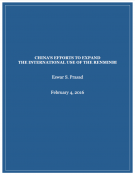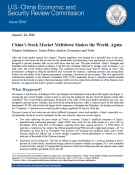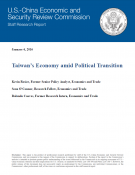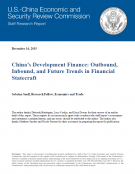Research: Economics and Trade
Research

The report examines the Chinese government’s actions to promote the use of its currency, the renminbi (RMB), in the global monetary system as a payment currency for cross-border trade and financial transactions, a vehicle currency for foreign trade and international capital transactions, and a reserve currency. The report analyzes the potential effects of the rising prominence of the RMB on the financial clout of the United States and the U.S. dollar’s role in denominating international trade transactions and settling cross-border financial transactions.
Research

After the stock market turmoil last August, Chinese regulators were hoping for a peaceful start to the year, preparing to wind down the ban on sales for big shareholders and launching a new mechanism (a circuit breaker) designed to prevent dramatic falls on par with those seen last year. The plan backfired. China’s Shanghai and Shenzhen stock markets crashed on January 4, the first day of trading, followed by another crash on January 7; in both cases, the circuit breaker halted trading. The combined rout erased more than $1 trillion of value. The government’s attempts to stem the meltdown only worsened the situation, confusing investors and raising fresh doubts over the ability of the Chinese government to manage a slowdown in the economy. They also exposed the contradiction inherent in the Chinese Communist Party (CCP) leadership trying to introduce market-oriented policies for the broader economy while maintaining control over the composition and behavior of the Chinese stock markets—an approach that leads to greater volatility and moral hazard.
Research

Leading up to the 2016 election, Taiwan’s electorate has grown largely dissatisfied with the state of the domestic economy and increasingly worried about Taiwan’s growing dependence on China. Amid stagnant growth and wages, the Democratic Progressive Party (DPP) has focused its campaign on improving Taiwan’s domestic economy through expanded social welfare benefits, a higher minimum wage, and new local sources of innovation. Meanwhile, the economic platform of the Chinese Nationalist Party (Kuomintang, or KMT) has largely been defined by promoting Taiwan’s external economic relations, especially with China, as a means of supporting export-led growth. This report provides an objective review of major economic indicators in Taiwan, and evaluates the implications of political transition for Taiwan’s economic relations with China, the United States, and the international community.
Research

Despite China’s rapidly growing overseas engagement and recent multilateral initiatives, the country still receives development finance from a variety of governments and institutions. From a development perspective, China thus challenges convention and, like other middle-income countries, straddles the divide between a developing nation requiring external assistance and an emerging power assuming global leadership roles. This report examines China’s concurrent positions as a recipient and a provider of development finance, evaluating the objectives driving global finance flows, and assessing the impact of these flows on U.S. economic and diplomatic interests.
Research
China’s strict regulation of entertainment imports, including foreign films, violates the country’s World Trade Organization (WTO) commitments, as determined in a 2007 WTO decision calling for China to open its film market to foreign films. After years of noncompliance and inaction, China partially opened its film market in 2012 following a deal with the United States. The deal allowed for the import of 34 films each year—up from the previous limit of 20 films—in exchange for a temporary suspension of further U.S. WTO actions against China’s film importation policies. During Chinese President Xi Jinping’s September 2015 visit to the United States, the Motion Picture Association of America and China Film Group reached two new film agreements, which could increase market access for foreign films in China. Based on recent history, however, promises that China will further open its film market should be viewed skeptically.
Chinese box office sales have increased alongside China’s standard of living, resulting in China surpassing Japan as the world’s second largest film market (behind the United States) in 2012. If global film market growth rates remain consistent over the next few years, many experts expect China to surpass the United States as the largest film market in the world as early as 2018. Hollywood relies on China’s film market for revenue, but the process to get films into China is arduous due to strict and opaque regulation of film imports. China’s regulations and processes for approving foreign films reflect the Chinese Communist Party’s position that art, including film, is a method of social control. As a result of these regulations, Hollywood filmmakers are required to cut out any scenes, dialogue, and themes that may be perceived as a slight to the Chinese government. With an eye toward distribution in China, American filmmakers increasingly edit films in anticipation of Chinese censors’ many potential sensitivities.
